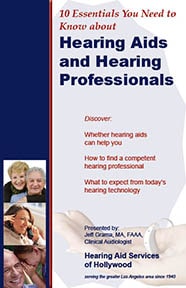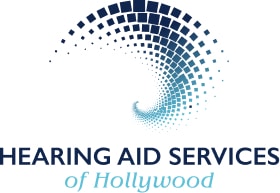7 Questions You Should Ask Hearing Professionals Before Making an Appointment
Are you an audiologist?
Audiologists hold advanced degrees from accredited universities and have special training in the identification, assessment and non-medical treatment of hearing disorders. They must complete a full-time internship, pass a demanding national examination and be licensed by the state. The only requirements for hearing aid dispensers are a high school diploma and a passing score on a state exam. Audiologists, therefore, are the most qualified individuals to fit hearing aids.
How long have you been fitting hearing aids?

An audiologist who has fitted thousands of patients is more likely to recognize and solve problems. Fitting hearing aids correctly is both an art and a science. The experienced audiologist will maximize the potential of your hearing instruments by using all of the features of your products, while the less skilled might fail to activate up to 50% of the hearing aids’ capabilities.
How will you determine what’s best for my hearing situation?
Your audiologist should take a thorough history of your hearing problem, general health, expectations, lifestyle and dexterity. In addition to routine tone and speech testing, he must perform measurements for comfortable and uncomfortable loudness levels. The ultimate goal of all the testing is to improve your hearing sensitivity and reestablish normal loudness perception. Often, less seasoned professionals omit these time-consuming procedures, relying on manufacturer’s software to try to adjust away problems that occur during the fitting process.
Do all hearing aids work the same?
No, they don’t. Your audiologist should be able to elaborate on what today’s state-of-the-art hearing aids can and cannot do. Ask him to describe the advantages of what the leading hearing aid manufacturers offer, and why he is choosing the hearing instruments that he has recommended for you.
How many digital products do you work with and how computer savvy are you?
Each hearing aid manufacturer has unique software to program its hearing instruments. All of the software works differently. Some audiologists rely on only one product line because the adjustment software is complex, and they cannot assimilate the programming knowledge from multiple manufacturers.It is a good sign when your audiologist works with several manufacturers. Every hearing loss is unique and one manufacturer’s product line cannot meet the needs of everyone. The audiologist who works with several manufacturers will be in the best position possible to select the product that will match your needs. Professionals who rely on only one product line will work to a lower standard and get mediocre results because of their limited software knowledge.
What fees and costs should I expect?
There should never be any surprises. All costs should be explained to you up front. Your audiologist should strive to work within your budget to give you maximum value for your dollar.
What if I’m not satisfied?
Your audiologist should explain that California law requires a 45-day trial period for any hearing instruments you are evaluating. He should also inform you that you are entitled to a FULL refund if you are not satisfied for any reason at the end of the trial period. Be suspicious if you are not informed of these rights.
Why you should consider Hearing Aid Services of Hollywood
On your first visit, you’ll receive a comprehensive examination from Jeff Grama, M.A., an audiologist with 33 years experience. Mr. Grama has completed over 250 hours of digital hearing technology training, holds more than 40 certifications from leading hearing aid manufacturers and has fit over 3,300 digital hearing instruments. Patients receive maximum benefit because he chooses the right product based on their degree of hearing loss, lifestyle and budget. He’ll select the appropriate instruments from a variety of leading manufacturers including Widex, Oticon, Phonak, GN ReSound, Siemens and others.
Take These Steps Before Purchasing Hearing Aids

Unfortunately, not every hearing professional chooses the most appropriate hearing instruments based on their patients’ type and severity of hearing loss, lifestyle and budget. All too often, hearing aids are not properly fitted and programmed. When this is the case, patients do not receive the maximum benefit the instruments were designed to deliver.
What is your best solution? Get educated. You should become informed about the different brands, models, latest technology and performance levels of today’s hearing aids. This will enable you to contribute more to the decision-making process. By working with your audiologist, you’ll be more likely to purchase the best hearing instruments for your hearing situation and lifestyle.
Learn how to choose the right hearing professionalPrior to choosing an audiologist, there are seven questions you should ask… even when you receive a friend’s recommendation! Finding the hearing professional who gives the right answers will give you the best opportunity to maximum the benefits you receive from your hearing aids.
Read “Ten Essentials You Need to Understand about Hearing Aids and Hearing Professionals”This valuable report will inform you how to choose a competent hearing professional, what you can expect on your initial visit and how to ensure you will receive maximum benefit from the hearing aids you purchase. Whether you live in Southern California or thousands of miles from our office, reading this report is a must.

